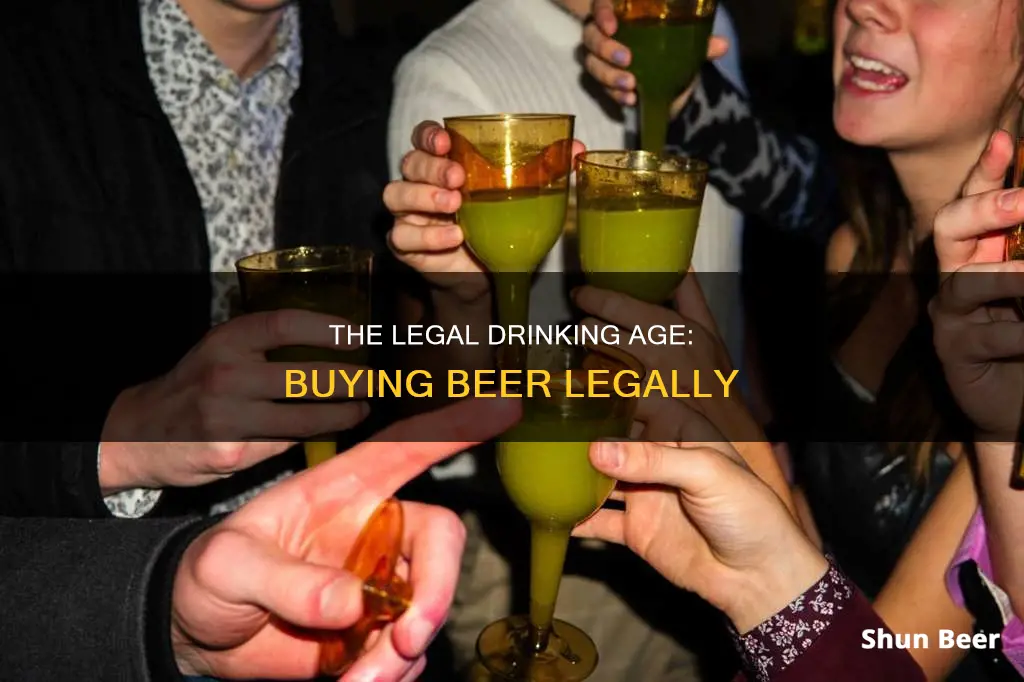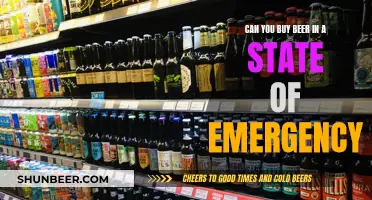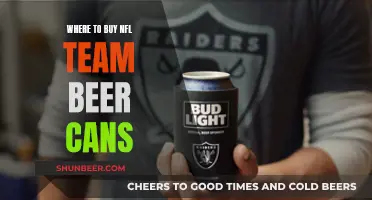
The legal drinking age in the United States is 21. However, the laws surrounding the purchase of non-alcoholic beverages are less clear. Non-alcoholic beer typically contains up to 0.5% alcohol by volume (ABV), which is significantly less than the 4-6% ABV found in traditional beer. While the National Minimum Drinking Age Act of 1984 prohibits the sale of beverages containing alcohol to those under 21, it does not specifically mention non-alcoholic beer. As a result, the laws regarding the purchase of non-alcoholic beer vary from state to state. In some states, such as Ohio, individuals over the age of 18 can purchase non-alcoholic beer, while in other states, such as Oregon, West Virginia, and Wyoming, individuals under 21 are prohibited from doing so.
| Characteristics | Values |
|---|---|
| Age restriction for NA beer in the US | 21 |
| Age restriction for NA beer in the UK | None |
| ABV of NA beer | 0.5% or under |
| States where you can buy NA beer under 21 | Ohio (over 18) |
| States where you can't buy NA beer under 21 | Oregon, West Virginia, Wyoming (for 0.5% ABV and above) |
| States with undefined laws | Alabama |
What You'll Learn

Non-alcoholic beer is not 100% alcohol-free
The legal drinking age varies across the world. In the United States, for instance, individuals need to be at least 21 years old to purchase beverages containing alcohol. However, this does not mean that those under the legal drinking age cannot consume alcohol. In many states, minors are allowed to consume alcoholic beverages under certain conditions, such as parental supervision.
Now, what about non-alcoholic beer? Can minors drink it? Well, that depends on where you live. While the purchase of non-alcoholic beer is illegal for individuals under 21 in most US states, consumption may be allowed. Some states, like Alabama, Louisiana, Mississippi, and North Dakota, permit minors to consume non-alcoholic beer with parental permission or in the presence of a parent or guardian. However, it is important to note that the laws vary by state, and not all states have the same definition of what constitutes an alcoholic beverage.
It is worth noting that non-alcoholic beer is not always completely alcohol-free. In the United States, beverages containing less than 0.5% alcohol by volume (ABV) can be labelled as "non-alcoholic". While this amount of alcohol is not enough to cause intoxication, it is important to know that non-alcoholic beer may still contain trace amounts of alcohol. So, if you are looking for a truly alcohol-free option, be sure to check the label carefully.
The question of whether non-alcoholic beer is suitable for minors or individuals in recovery from alcoholism is complex. On the one hand, non-alcoholic beer provides an option for those who want the taste of beer without the intoxicating effects. On the other hand, some people may find that the taste and appearance of non-alcoholic beer trigger cravings for regular beer. Additionally, even trace amounts of alcohol may be unacceptable for certain religious or personal reasons. Ultimately, the decision to consume non-alcoholic beer depends on individual circumstances and preferences.
Tennessee's Midnight Beer Buying Rules Explained
You may want to see also

The legal drinking age in the US is 21
In the United States, the legal drinking age is 21. This means that alcohol cannot be sold to anyone under the age of 21. The minimum legal drinking age (MLDA) laws are in place to protect everyone, especially young people, from alcohol-related harm. These laws have been proven to save lives by reducing motor vehicle crashes, underage drinking, and improving individual and community health.
Before the National Minimum Drinking Age Act was passed in 1984, the legal drinking age varied by state. However, after the Act was passed, the federal government mandated a uniform MLDA of 21 across all states. This was done to address the safety concerns associated with youth drinking and driving, as well as to reduce the number of alcohol-related injuries and deaths among young people. Since the implementation of the Act, there has been a significant decrease in motor vehicle crashes and a drop in the percentage of young people who drink alcohol.
While the purchase and consumption of alcoholic beverages are prohibited for those under 21, there are some exceptions. In some states, minors are allowed to consume non-alcoholic beer, which typically contains less than 0.5% alcohol by volume (ABV), under the supervision of a parent, guardian, or spouse who is over the age of 21. Additionally, minors may be permitted to consume alcohol for specific reasons, such as religious purposes, medical reasons, or educational purposes.
It is important to note that the laws and retailer policies regarding the purchase and consumption of alcoholic and non-alcoholic beverages can vary from state to state. While the federal law sets the minimum legal drinking age at 21, each state may have its own specific laws and regulations regarding alcohol possession, consumption, and distribution. As a result, it is essential to be aware of the local regulations and retailer policies before attempting to purchase or consume any alcoholic or non-alcoholic beverage.
Buying Beer at Massachusetts Gas Stations: Is It Possible?
You may want to see also

State laws vary on the purchase of non-alcoholic beer
In Ohio, for example, individuals over the age of 18 can purchase non-alcoholic beer. On the other hand, states like Oregon, West Virginia, and Wyoming prohibit the purchase of non-alcoholic beer by minors, treating it the same as regular beer. In Alabama, the laws vary depending on the county, with "sale" prohibited in dry counties and not regulated in wet counties. Other states, like Louisiana, Mississippi, and New Mexico, allow minors to consume non-alcoholic beer with parental permission or in the presence of a parent or guardian.
The varying state laws make it challenging to determine the legality of purchasing non-alcoholic beer by minors, and most retailers choose to err on the side of caution by requiring customers to be at least 21. The production, distribution, and sale of non-alcoholic beer are also subject to federal laws, adding another layer of complexity to the regulations. Ultimately, it is essential to consult local regulations and retailer policies before attempting to purchase non-alcoholic beer as a minor.
Sunday Beer Buying in North Carolina: When's the Right Time?
You may want to see also

Minors can drink non-alcoholic beer in some states with parental permission
The laws surrounding the consumption of non-alcoholic beer by minors in the US are complex and vary from state to state. While federal law permits minors to consume non-alcoholic beverages, some states have their own laws prohibiting this.
In some states, minors are allowed to consume non-alcoholic beer with parental permission or in the presence of a parent or guardian. These states include Alabama, Louisiana, Mississippi, New Mexico, North Carolina, North Dakota, Ohio, Oklahoma, Oregon, West Virginia, and Wyoming. In Mississippi and North Dakota, minors aged 18-21 are permitted to drink non-alcoholic beer with parental consent, while in Ohio, the minimum age is 18.
However, it is important to note that the laws and retailer policies can vary significantly, and some establishments may have their own policies prohibiting the sale of alcohol to minors, even with parental consent. Therefore, it is essential to check the local regulations and retailer policies before attempting to purchase or consume non-alcoholic beer as a minor, even with parental permission.
Crescent City Beer: Where, When, and How to Buy
You may want to see also

Non-alcoholic beer is regulated by the Federal Alcohol Administration Act
Non-alcoholic beer has gained a lot of popularity, with its market share in the non-alcoholic beverage category doubling between 2020 and 2022. The segment is expected to continue growing, with the Brewers Association predicting that NA beer will make up over 5% of the beer market in the coming years.
Federal Treatment of Non-Alcoholic Beer
The Alcohol and Tobacco Tax and Trade Bureau's (TTB) regulations refer to a malt beverage containing less than 0.5% ABV as a "cereal beverage". Since non-alcoholic beer contains less than 0.5% ABV, it is not treated as "beer" under the Internal Revenue Code (IRC) and is not subject to federal alcohol excise taxes in the United States.
The FAAA does not indicate an ABV minimum, and any malt beverage, regardless of its alcohol content, is regulated by the Act if it meets the requirements of containing some malted barley, hops or hop parts, and having been subject to fermentation. This is why non-alcoholic beer falls under the FAAA's jurisdiction, even though its alcoholic content is below what is considered an alcoholic beverage.
State Regulations
While non-alcoholic beer is regulated by the FAAA, it's important to note that state laws and retailer policies can vary significantly. For example, some states have specific laws that directly regulate non-alcoholic malt beverages, such as Pennsylvania and Kansas. Additionally, most states have their own definitions of "beer", with the majority aligning with the IRC's definition, which includes a minimum threshold of 0.5% ABV. However, there are exceptions, such as Arizona, Georgia, Idaho, and Tennessee, which do not have a minimum ABV threshold for malt beverages subject to state laws.
The legal drinking age of 21 years is not a federal rule but is set by each individual state. While each state has set the legal drinking age to 21, they have different definitions of what constitutes an alcoholic beverage, and the laws and policies regarding the purchase and consumption of non-alcoholic beer by minors can vary.
In some states, minors are allowed to purchase and consume non-alcoholic beer, while in others, they are only permitted to consume it under certain conditions, such as with parental permission or in the presence of a parent or guardian.
Compliance Concerns
The production, distribution, and sale of non-alcoholic beer can be restricted by state and federal laws, and producers must comply with licensing, labelling, and formula requirements set out by the IRC and FAAA.
Final Thoughts
With the rising popularity of non-alcoholic beer, understanding the legal and regulatory landscape is crucial for producers, distributors, and consumers alike. While non-alcoholic beer is regulated by the FAAA at the federal level, it's important to recognize that state laws and retailer policies can vary, and it's essential to know the local regulations and policies before purchasing or consuming non-alcoholic beer, especially for minors.
Where to Buy Beer After 2 a.m.?
You may want to see also
Frequently asked questions
In the US, federal law prohibits the sale of alcoholic beverages to anyone under the age of 21. However, non-alcoholic beer typically contains up to 0.5% alcohol by volume (ABV), which is considered non-alcoholic. Since non-alcoholic beer is still regulated by the Federal Alcohol Administration Act, the minimum age to purchase it varies from state to state.
In the following states, buyers under the age of 21 are allowed to buy non-alcoholic beer:
- Ohio (must be over 18)
- District of Columbia
Buyers under the age of 21 are prohibited from purchasing non-alcoholic beer in the following states:
- Oregon (for 0.5% ABV and above)
- West Virginia (for 0.5% ABV and above)
- Wyoming (for 0.5% ABV and above)
Yes, the laws regarding the purchase of non-alcoholic beer by minors are not clear in the following states:
- Alabama (not regulated in wet counties, but "sale" is prohibited in dry counties)







